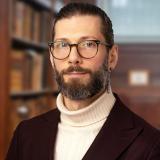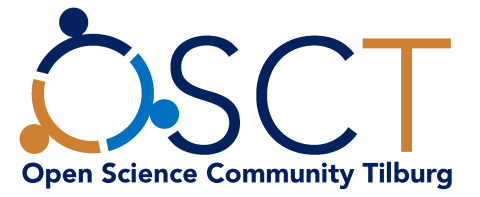Meet the OSCT: Caspar van Lissa, chair
A new core team has revitalized our open science community, and over the next few months, we introduce them to you! Each OSCT team member was asked to write a short blog post about their vision and expertise, so that our community members know who to contact for advice and discussion.
Today, we introduce you to Caspar van Lissa, associate professor of social data science at TSB, chair of our community, and board member of the Tilburg Young Academy. His research uses machine learning to find patterns in data that complement blind spots in existing theories. He also develops methods for synthesis of research findings and reproducible workflows that have been applied in diverse areas, ranging from climate research to mental health and well-being.

Why did you decide to apply to become chair of the Open Science Community?
Open science transformed my career: Despite having worked in several disciplines at four Dutch universities, I was always narrowly focused on my own research line. What I always missed was a sense of interdisciplinarity, collaboration, and enthusiasm about innovation in science. Becoming faculty ambassador, and later co-chair, of the Open Science Community Utrecht finally helped me find a community that shared those same values. I made new connections, even friends, and co-wrote many papers that contributed more than I could have done by myself. I also got the opportunity to help shape university policy and create institutional support for those who, like me, enjoy collaborating across disciplinary boundaries. Making the transition to Tilburg University motivates me to invest in building an equally supportive community here, so that (especially early career) colleagues can enjoy the same benefits I did.
Why is Open Science relevant for our university?
What excites me about Tilburg University is that it's a somewhat smaller and more specialized institution; that offers unique advantages in terms of team science and interdisciplinary collaboration. I feel like management stimulates this, for example through the ICON grants, and HSRI grants in my faculty of TSB. But there is still much room for the Open Science Community to facilitate informal interdisciplinary collaboration, particularly among early career scholars. Open science offers many opportunities: Transparency improves the quality and trustworthiness of research; open data, materials and code accelerates cumulative science, as researchers can benefit directly from the work of their predecessors; open access increases the visibility and impact of your work; public engagement increases the relevance, valorization, and support of academic research; and open educational materials allow you to innovate your teaching with limited effort. But most importantly, open science facilitates collaboration and community building - which makes our jobs much more enjoyable.
What role does open science play in your work?
Open science influences all aspects of my work. It is one of my research areas; for example, I have published a Workflow for Open Reproducible Code in Science, and contributed to work on preregistration. I give regular workshops and invited lectures about open science. All of my recent research is published open access, with fully reproducible and reusable code. Finally, I received several education innovation grants: one to integrate open science education in all bachelor programs of Utrecht University's Faculty of Social and Behavioral Sciences, and one to educate teachers in the use and development of open educational materials. My current focus is on developing free open source research software that allows researchers to perform cutting edge analyses, and open educational materials. For example, I just finished a free interactive eBook that combines text, knowledge clips, formative self-assessments, and interactive apps to explain core concepts visually for my course Statistics 1 and 2 at University College Tilburg.
Which challenges do you expect to face in the road ahead?
Tilburg University has historically been at the forefront of Open Science, but it seems that at this particular moment, it is no longer front of mind. For example, the strategic plan "Weaving Minds & Characters" does not discuss it in a meaningful way. This is a missed opportunity, because the open science transition has passed the tipping point: its importance is now acknowledged by national and European funding bodies, our government, and most universities. Open science is now a required element of most grant applications, and there are no longer real obstacles to open access publishing, ad minimum, in parallel to the traditional outlets. Failing to ride the wave of this transition comes at a huge opportunity cost. I think the main challenge experienced by individual colleagues is the initial time investment of transitioning to new ways of working. While I agree that this is an important consideration, my experience has been that open science really increases the efficiency and impact of work. Many open science practices focus on making sure any work we do can be easily re-used and repurposed, and accessing and repurposing the work done by others. If you strike the right balance between contributing to the scientific community and making use of existing resources, the initial time investment quickly pays off. Our goal for the Open Science Community Tilburg is to help colleagues make that transition, and make new supportive connections in the process.
If you want to receive updates and attend meet-ups and skills courses;

